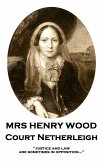In "Court Netherleigh," Mrs. Henry Wood crafts a captivating narrative imbued with the intricate themes of social class, morality, and the complexities of human relationships in Victorian England. Through meticulously drawn characters and vivid descriptions, Wood presents a compelling exploration of the lives of the gentry and their interactions with the world around them. The novel intertwines elements of melodrama and realism, reflecting the literary trends of its time while also showcasing Wood's talent for detail and characterization, skillfully drawing readers into the social fabric of her era. Mrs. Henry Wood, an influential figure in 19th-century English literature, gained popularity for her serialized stories and keen insights into contemporary society. Growing up in a middle-class family, Wood's exposure to various social strata provided her with a unique perspective that she deftly interwove into her narratives. Her experiences as a writer and editor, along with her personal challenges, deeply informed her literary voice, enabling her to address moral dilemmas with both sensitivity and insight in "Court Netherleigh." For readers seeking an engaging and thought-provoking read, "Court Netherleigh" stands as a testament to the enduring power of Victorian literature. With its rich character development and social nuances, this novel will appeal to both scholars and casual readers alike, offering a window into a bygone era while raising timeless questions about human nature and societal expectations.
Dieser Download kann aus rechtlichen Gründen nur mit Rechnungsadresse in A, B, BG, CY, CZ, D, DK, EW, E, FIN, F, GR, H, IRL, I, LT, L, LR, M, NL, PL, P, R, S, SLO, SK ausgeliefert werden.
Hinweis: Dieser Artikel kann nur an eine deutsche Lieferadresse ausgeliefert werden.









